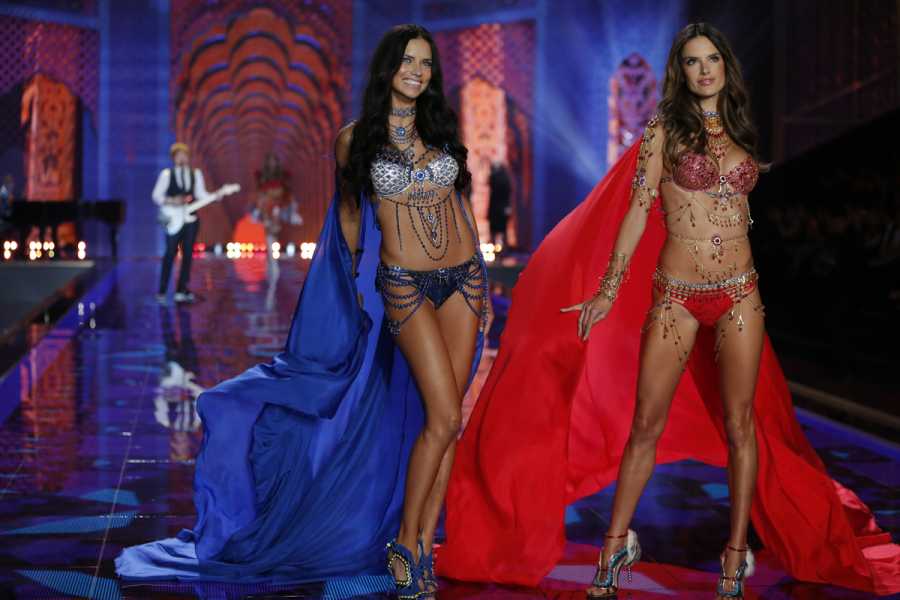Fashion shows and feminism
Glitter, wings and 8-inch stilettos came together last week in London for the annual Victoria’s Secret Fashion Show, which aired last night on CBS.
The show drew in 9.1 million viewers, according to the Los Angeles Times. The world’s most accomplished, highest paid supermodels, known as Angels, took to the stage along with musical performances from Taylor Swift, Ed Sheeran, Hozier and Ariana Grande.
Every year, the show invokes an influx of negative criticism from people who say that the show objectifies and hypersexualizes women. Critics, male and female alike, disapprove of racy commercials, skinny women and revealing lingerie.
A feminist beauty blog, beautyredefined.net, called upon its readers to boycott Victoria’s Secret in an article that reads, “This is a company that rakes in $5 billion annually by selling sexually objectifying and limiting messages to all ages under the guise of empowerment”.
I cannot disagree that Victoria’s Secret does play a role in creating the image of what an ideal woman should look like, with endless legs and an invisible waist, but those who say feminists should boycott the whole company are not addressing the problem.
I am a feminist and believe in equal social and political rights for the genders. The sexism debate needs to emphasize the word equal. Even as women are trying to fight for equality, sometimes they end up holding us females to higher standards than men. Physical insecurities do not only plague girls, but commentary about the media’s role in creating the perception of a man’s perfect body is rarely heard.
Why is there never an uproar about objectifying men when a “Magic Mike” movie comes out? Why when Nick Jonas releases exposing photos of himself, it is encouraged, but when Miley Cyrus wears a leotard on stage, she’s being a bad role-model to young girls? Why is that when a man with a six-pack takes off his shirt, its exciting, attractive and all in good fun, but when a skinny woman confidently shows off her body, she is conforming to societal ideals that are looking to destroy her entire gender?
The problem is not that the media showcases the tall and thin, but that young girls grow up believing that is how they are supposed to look. In the media, both men and women are constantly objectified, so there should not only be an outcry when women are victims of hypersexualization. Rather than placing pressure on ourselves to attain supposed “perfection”, we need to learn how to accept ourselves without the media’s input.
By only limiting the actions of one gender in the media, people are inherently promoting sexism. As long as shirtless males are allowed to flaunt across television shows and movies without any backlash, Victoria’s Secret Angels should be able to show off their bodies and spread messages of confidence without the endless criticism.


















![“[Building nerf blasters] became this outlet of creativity for me that hasn't been matched by anything else. The process [of] making a build complete to your desire is such a painstakingly difficult process, but I've had to learn from [the skills needed from] soldering to proper painting. There's so many different options for everything, if you think about it, it exists. The best part is [that] if it doesn't exist, you can build it yourself," Ishaan Parate said.](https://harkeraquila.com/wp-content/uploads/2022/08/DSC_8149-900x604.jpg)




![“When I came into high school, I was ready to be a follower. But DECA was a game changer for me. It helped me overcome my fear of public speaking, and it's played such a major role in who I've become today. To be able to successfully lead a chapter of 150 students, an officer team and be one of the upperclassmen I once really admired is something I'm [really] proud of,” Anvitha Tummala ('21) said.](https://harkeraquila.com/wp-content/uploads/2021/07/Screen-Shot-2021-07-25-at-9.50.05-AM-900x594.png)







![“I think getting up in the morning and having a sense of purpose [is exciting]. I think without a certain amount of drive, life is kind of obsolete and mundane, and I think having that every single day is what makes each day unique and kind of makes life exciting,” Neymika Jain (12) said.](https://harkeraquila.com/wp-content/uploads/2017/06/Screen-Shot-2017-06-03-at-4.54.16-PM.png)








![“My slogan is ‘slow feet, don’t eat, and I’m hungry.’ You need to run fast to get where you are–you aren't going to get those championships if you aren't fast,” Angel Cervantes (12) said. “I want to do well in school on my tests and in track and win championships for my team. I live by that, [and] I can do that anywhere: in the classroom or on the field.”](https://harkeraquila.com/wp-content/uploads/2018/06/DSC5146-900x601.jpg)
![“[Volleyball has] taught me how to fall correctly, and another thing it taught is that you don’t have to be the best at something to be good at it. If you just hit the ball in a smart way, then it still scores points and you’re good at it. You could be a background player and still make a much bigger impact on the team than you would think,” Anya Gert (’20) said.](https://harkeraquila.com/wp-content/uploads/2020/06/AnnaGert_JinTuan_HoHPhotoEdited-600x900.jpeg)

![“I'm not nearly there yet, but [my confidence has] definitely been getting better since I was pretty shy and timid coming into Harker my freshman year. I know that there's a lot of people that are really confident in what they do, and I really admire them. Everyone's so driven and that has really pushed me to kind of try to find my own place in high school and be more confident,” Alyssa Huang (’20) said.](https://harkeraquila.com/wp-content/uploads/2020/06/AlyssaHuang_EmilyChen_HoHPhoto-900x749.jpeg)



